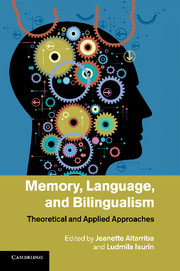Book contents
- Memory, Language, and Bilingualism
- Memory, Language, and Bilingualism
- Copyright page
- Contents
- Figures
- Tables
- Contributors
- Introduction
- 1 Bilingual memory:
- 2 Lexical competition in localist and distributed connectionist models of L2 acquisition
- 3 Working memory and (second) language processing
- 4 Working memory in simultaneous interpreters
- 5 Using electrophysiological measures to track the mapping of words to concepts in the bilingual brain:
- 6 Age effects in L2 learning:
- 7 Bilingualism, language, and aging
- 8 Crossovers and codeswitching in the investigation of immigrant autobiographical memory
- 9 Linguistic relativity and bilingualism
- 10 Testing effects for novel word learning in Chinese–English bilinguals
- 11 The lexicon in second language attrition:
- 12 Memory and first language forgetting
- 13 Future research directions:
- Index
9 - Linguistic relativity and bilingualism
Published online by Cambridge University Press: 05 November 2012
- Memory, Language, and Bilingualism
- Memory, Language, and Bilingualism
- Copyright page
- Contents
- Figures
- Tables
- Contributors
- Introduction
- 1 Bilingual memory:
- 2 Lexical competition in localist and distributed connectionist models of L2 acquisition
- 3 Working memory and (second) language processing
- 4 Working memory in simultaneous interpreters
- 5 Using electrophysiological measures to track the mapping of words to concepts in the bilingual brain:
- 6 Age effects in L2 learning:
- 7 Bilingualism, language, and aging
- 8 Crossovers and codeswitching in the investigation of immigrant autobiographical memory
- 9 Linguistic relativity and bilingualism
- 10 Testing effects for novel word learning in Chinese–English bilinguals
- 11 The lexicon in second language attrition:
- 12 Memory and first language forgetting
- 13 Future research directions:
- Index
Summary
If our native language affects our thinking, can learning a new language restructure our mental representations of reality and the world? The current chapter will attempt to answer that question, drawing on recent empirical evidence from a variety of research domains. We consider a range of variables that may modulate bilingual cognition and conceptualization, and we discuss the ways in which the ongoing investigation of the bilingual mind from a relativistic perspective has significantly added to our knowledge of how bilinguals mentally represent categories in their mind.
Information
- Type
- Chapter
- Information
- Memory, Language, and BilingualismTheoretical and Applied Approaches, pp. 236 - 255Publisher: Cambridge University PressPrint publication year: 2012
Accessibility standard: Unknown
Why this information is here
This section outlines the accessibility features of this content - including support for screen readers, full keyboard navigation and high-contrast display options. This may not be relevant for you.Accessibility Information
- 9
- Cited by
